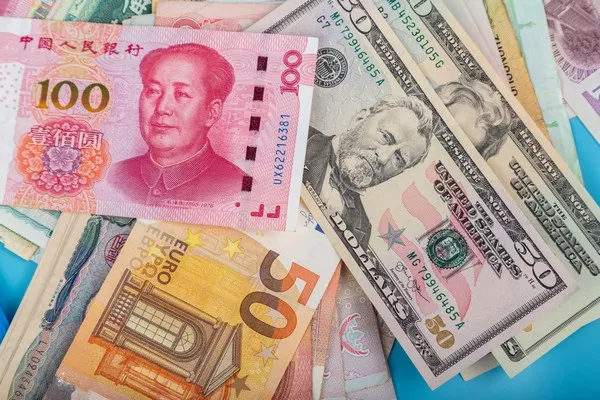In the intricate web of international finance and trade, the value of a currency extends far beyond its numerical representation. Among the currencies that play a crucial role in the global marketplace, the Chinese Yuan, or Renminbi, holds a distinct position. This article aims to delve into the multifaceted dimensions of the value of 1 Yuan, exploring its economic, geopolitical, and socio-cultural significance.
Economic Significance
At its core, the value of 1 Yuan reflects the economic strength and stability of the People’s Republic of China. As the world’s second-largest economy, China’s currency serves as a barometer for global economic health. Investors, economists, and policymakers closely monitor the exchange rate of the Yuan as it provides insights into China’s trade dynamics, monetary policies, and overall economic performance.
The Yuan’s value is crucial for international trade, influencing the cost of Chinese exports and the affordability of imports for Chinese consumers. As a competitive currency, a relatively low value of the Yuan can make Chinese goods more attractive to foreign buyers, thereby boosting the country’s exports. Conversely, a stronger Yuan can enhance the purchasing power of Chinese consumers in the global marketplace.
Geopolitical Implications
The value of 1 Yuan is not confined to economic realms; it also carries geopolitical implications that resonate across borders. China’s efforts to internationalize its currency have gained momentum in recent years, challenging the dominance of traditional reserve currencies such as the U.S. Dollar and the Euro. The strategic significance of the Yuan’s value lies in its potential to reshape the global financial landscape.
As China seeks a more prominent role in international finance, the value of the Yuan becomes a tool for geopolitical influence. Inclusion in major global currency baskets, such as the International Monetary Fund’s (IMF) Special Drawing Rights (SDR), underscores the Yuan’s legitimacy on the world stage. The value of 1 Yuan, therefore, reflects not only economic factors but also China’s geopolitical aspirations and its quest for a more diversified and balanced global financial system.
Socio-Cultural Reflections
Beyond economic and geopolitical considerations, the value of 1 Yuan carries socio-cultural reflections embedded in the rich history and traditions of China. The symbolism of the currency extends to the cultural identity and national pride of the Chinese people. As a tangible representation of China’s economic rise, the Yuan serves as a source of collective pride, reflecting the nation’s resilience and achievements.
Moreover, the value of 1 Yuan is intimately linked to the daily lives of millions of Chinese citizens. It influences purchasing power, inflation rates, and the overall cost of living. Understanding the fluctuations in the Yuan’s value is essential for individuals, households, and businesses, shaping consumption patterns and investment decisions. As a result, the currency becomes a mirror reflecting the economic well-being and aspirations of the Chinese society at large.
Global Currency Dynamics
In the interconnected global economy, the value of 1 Yuan is not an isolated phenomenon. It is part of a complex web of currency dynamics, where exchange rates between the Yuan and other major currencies play a pivotal role. The relationship between the Yuan and the U.S. Dollar, often scrutinized by economists and policymakers, can impact trade balances, investment flows, and monetary policies on a global scale.
The volatility in the value of the Yuan can reverberate through financial markets worldwide, affecting not only China but also its trading partners and competitors. Central banks and financial institutions carefully monitor currency movements, as they can have far-reaching implications for international trade relationships and financial stability. The value of 1 Yuan, therefore, becomes a critical variable in the intricate dance of global currencies.
Challenges and Opportunities
While the value of 1 Yuan holds immense significance, it is not without its challenges and opportunities. China faces the delicate task of balancing the need for a stable and competitive currency with the inherent risks of economic imbalances and external pressures. Managing the exchange rate requires a nuanced approach, considering both domestic economic priorities and international expectations.
For China, a controlled depreciation of the Yuan can stimulate exports and economic growth but risks attracting accusations of currency manipulation. On the other hand, a rapid appreciation may lead to challenges in maintaining export competitiveness and could potentially slow down economic expansion. Striking the right balance is essential for China to navigate the complexities of the global economic landscape while preserving its domestic stability and growth.
Conclusion
In conclusion, the value of 1 Yuan is a multifaceted phenomenon that transcends its numerical representation. It is a key indicator of China’s economic strength, a tool for geopolitical influence, a reflection of socio-cultural identity, and a participant in the global currency dynamics. Understanding the intricacies of the Yuan’s value is essential for a comprehensive grasp of the global economic landscape, as it influences trade relationships, financial markets, and the daily lives of millions. As China continues to play an increasingly central role in the world economy, the value of 1 Yuan will undoubtedly remain a subject of keen interest and scrutiny on the global stage.


